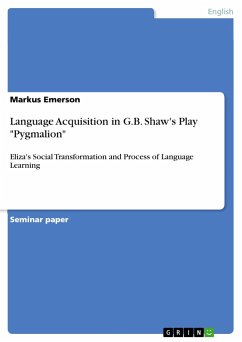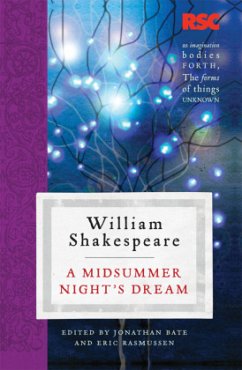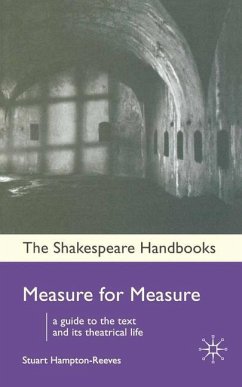
Language Acquisition in G.B. Shaw's Play "Pygmalion"
Eliza's Social Transformation and Process of Language Learning

PAYBACK Punkte
0 °P sammeln!
Seminar paper from the year 2010 in the subject English Language and Literature Studies - Literature, grade: 1,0, TU Dortmund (Britische Kultur und Literaturwissenschaft), course: British Literary Studies, language: English, abstract: This term-paper will deal with language acquisition in G. B. Shaw's play "Pygmalion" and the question whether Eliza's acquisition of higher, conventional English is comparable to second-language acquisition. This means classifying Eliza's Cockney, the London lower-class sociolect of the English language, as a different and independent form of the 'Standard Englis...
Seminar paper from the year 2010 in the subject English Language and Literature Studies - Literature, grade: 1,0, TU Dortmund (Britische Kultur und Literaturwissenschaft), course: British Literary Studies, language: English, abstract: This term-paper will deal with language acquisition in G. B. Shaw's play "Pygmalion" and the question whether Eliza's acquisition of higher, conventional English is comparable to second-language acquisition. This means classifying Eliza's Cockney, the London lower-class sociolect of the English language, as a different and independent form of the 'Standard English', which she is taught by Henry Higgins. Following this classification, light can be shed upon the resemblances with second-language acquisition. Phonetician Henry Higgins and Colonel Pickering, are both experts concerning languages and agree to a bet, which is essential for this paper. This bet includes Higgins to teach Eliza the higher English language combined with the appropriate manners. Higgins supposes that transforming Eliza's speech, behaviour and appearance will make her a convincing duchess in the higher society of London. Although Pygmalion's preface is called "A Professor of Phonetics" and alludes to Higgins' profession, the play does not explicitly concentrate on the process of Eliza's linguistic and social transformation but demonstrates the outcome of her process. Nevertheless, the paper will focus on the limited amount of information concerning Eliza's sociolect and her language acquisition in order to see whether it is comparable to second-language acquisition.Additionally, it should be mentioned that the paper will deal with the issue of language and acquisition of language from a modern point of view. The term sociolect for example "emerged in the 1960s" (Ammon 2004, 200) and was not known in Shaw's lifetime.













